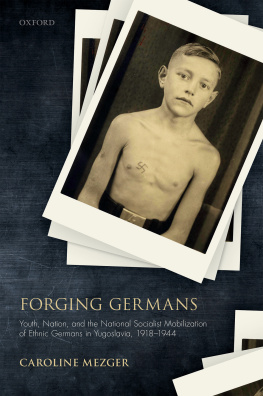Studies In German History
Series Editors
Neil Gregor (Southampton)
Len Scales (Durham)
Editorial Board
Simon MacLean (St Andrews)
Frank Rexroth (Gttingen)
Ulinka Rublack (Cambridge)
Joel Harrington (Vanderbilt)
Yair Mintzker (Princeton)
Svenja Goltermann (Zrich)
Maiken Umbach (Nottingham)
Paul Betts (Oxford)

Great Clarendon Street, Oxford, OX2 6DP, United Kingdom
Oxford University Press is a department of the University of Oxford. It furthers the Universitys objective of excellence in research, scholarship, and education by publishing worldwide. Oxford is a registered trade mark of Oxford University Press in the UK and in certain other countries
Caroline Mezger 2020
The moral rights of the author have been asserted
First Edition published in 2020
Impression: 1
All rights reserved. No part of this publication may be reproduced, stored in a retrieval system, or transmitted, in any form or by any means, without the prior permission in writing of Oxford University Press, or as expressly permitted by law, by licence or under terms agreed with the appropriate reprographics rights organization. Enquiries concerning reproduction outside the scope of the above should be sent to the Rights Department, Oxford University Press, at the address above
You must not circulate this work in any other form and you must impose this same condition on any acquirer
Published in the United States of America by Oxford University Press
198 Madison Avenue, New York, NY 10016, United States of America
British Library Cataloguing in Publication Data
Data available
Library of Congress Control Number: 2020930973
ISBN 9780198850168
ebook ISBN 9780192590473
DOI: 10.1093/oso/9780198850168.001.0001
Printed and bound by CPI Group (UK) Ltd, Croydon, CR0 4YY
Links to third party websites are provided by Oxford in good faith and for information only. Oxford disclaims any responsibility for the materials contained in any third party website referenced in this work.
To my father, Erik B. Mezger
Acknowledgments
Though the work of one author, this book embodies the dedication, support, and generosity of many individuals. Over the course of nearly ten years of research, writing, and reflection, I have incurred debts of gratitude to people across countries and institutions, and I would like to thank them sincerely for the invaluable parts they have played in the completion of this project.
This book is a profoundly revised and heavily abridged version of my doctoral dissertation, Youth, Nation, and the National Socialist Mobilization of Ethnic Germans in the Western Banat and the Batschka (19181944), which I defended at the European University Institute in Florence in September 2016. At the EUI, I had the great fortune of meeting Laura Lee Downs, who acted as my dissertations supervisor, tirelessly contributed her extraordinary insight, and inspired me to develop my work to its fullest. I thank her wholeheartedly for her many years of encouragement and support. My work similarly owes a tremendous debt to my second reader, Pieter M. Judson, whose outstanding expertise and acumen were central to my engagement with this books most difficult questions.
Several historians generously shared their knowledge and observations with me. As members of my doctoral defense committee, Tara Zahra and Doris L. Bergen engaged closely with my work, asked incisive questions, and contributed valuable insight that helped lay the foundation for my manuscripts transformation into this book. My former M.A. supervisors at Central European University (Budapest), Balzs Trencsnyi and Marsha Siefert, were crucial in helping me to develop my skills as a historian and set the geographical and theoretical parameters of my work. Pavel Kol was particularly helpful with the initial conceptualization of this project, Zsolt Vitri introduced me to literature on youth mobilization in Hungary, and Zoran Janjetovi provided me with essential clues about existing studies and sources. Across degree programs, workshops, conferences, and places of employment, I always encountered fruitful questions and comments by talented colleaguesI thank all of them for the perspectives they have granted me over the years.
This work would have been impossible without the generosity of my interviewees, who remain anonymous in this book. It was their experiences and stories that initially ignited my interest in this topic and granted me insights that I could have gleaned nowhere else; it was their tireless willingness to share some of their most difficult moments that drove me to write their history. Thank you also to the many individuals who helped put us in touch with each other, including Leo Mayer, Ann Morrison, and Ernst Meinhardt.
Two individuals in particular provided me with invaluable sources. Henriette Mojem helped organize multiple interviews, showed enormous hospitality, and shared her profound knowledge of the Donauschwaben as I researched at the Haus der Donauschwaben (Sindelfingen). Boris Mai of the Deutscher Brgerverein Adam Berenz (Apatin) similarly hosted me kindly during two research trips in Serbia: he gave me a tour of the Batschkas German churches, granted me unlimited access to the associations archive and library, and ensured that my stay in Apatin was comfortable and fruitful.
Historians always depend on the vast knowledge and support of the archivists, librarians, and general staff of the institutions that host their sources. I would like to thank the employees of the following institutions for their dedication to this project: the Bayerische Staatsbibliothek; the Bundesarchiv Auenstelle Ludwigsburg; the Bundesarchiv in Berlin-Lichterfelde; the Deutsche Brgerverein Adam Berenz; the Haus der Donauschwaben in Sindelfingen; the Historical Archives of Novi Sad; the Historical Archives of Sombor; the Historical Archive of Zrenjanin; the Institut fr deutsche Kultur und Geschichte Sdosteuropas; the library of the Institut fr Zeitgeschichte; the Matica Srpska; the Museum of Vojvodina; the National Museum of Zrenjanin; the National Szchnyi Library in Budapest; the Politisches Archiv des Auswrtigen Amts; the Serbian National Library in Belgrade; the Staatsarchiv Ludwigsburg; the Staatsbibliothek zu Berlin; the Town Library Karlo Bijelicki in Sombor; and the Ungarndeutsche Bibliothek in Budapest. I would like to thank Filip Krmar of the Historical Archive of Zrenjanin and Kristina Menei of the Museum of Vojvodina especially, for helping me navigate crucial collections and providing me with important images for this book.
My doctoral research was supported financially by the Swiss State Secretariat for Education, Research and Innovation (SERI), which granted me a Ph.D. scholarship. The EUIs Department of History and Civilization graciously subsidized my research missions in Germany, Hungary, and Serbia, several conference presentations, and Hungarian and Serbian language courses. Furthermore, the ERASMUS program enabled me to spend five exceedingly productive and enjoyable months at the Humboldt-Universitt zu Berlin. Additional financial assistance central to this books research and writing was provided by Central European University, which granted travel funding for my archival work as a masters student, the Institut fr deutsche Kultur und Geschichte Sdosteuropas, which enabled a prolonged research stay in Munich, and the Leibniz Institute for Contemporary History (IfZ) in Munich, which helped finance Serbian lessons and a final archival research mission.








